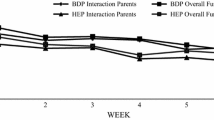Abstract
While the field of social work is heavily committed to the treatment of children and adolescents with behavior problems, it has given little attention to the application of Piaget's egocentrism theory to these problems. This paper outlines the theory proposed by Piaget and reviews subsequent empirical validation and clinical applications of his theory. The role of social work in developing more sophisticated applications of Piaget's theory is discussed.
Similar content being viewed by others
References
Bayley, N. The growth of intelligence.American Psychologist, 1955,10, 805–18.
Binet, A.:The development of intelligence in children (translated by Elizabeth S. Kite). Baltimore: Williams and Wilkins, 1916.
Cameron, N.: Experimental analysis of schizophrenic thinking. In: J. S. Kasanin (Ed.),Language and thought in schizophrenia. Berkeley: University of California Press, 1954, 50–62.
Chandler, M. Egocentrism and antisocial behavior: The assessment and training of social perspective-taking skills.Developmental Psychology, 1973,9, 1–6.
Chandler, M., Greenspan, S., & Barenbohm, C.: Assessment and training of role-taking and referential communication skills in institutionalized emotionally disturbed children.Developmental Psychology, 1974,10, 546–553.
Deutsch, F. Female preschoolers' perceptions of affective responses and interpersonal behavior in video-taped episodes.Developmental Psychology, 1974,10, 733–740.
Elkind, D., & Scott, L. Studies in perceptual development: I. The decentering of perception.Child Development, 1962,33, 619–630.
Feffer, M. H. A developmental analysis of interpersonal behavior.Psychological Review, 1970,77, 197–214.
Feffer, M. H. The cognitive implications of role-taking behavior.Journal of Personality, 1959,27, 152–168.
Feffer, M. H., & Gourevitch, V. Cognitive aspects of role-taking in children.Journal of Personality, 1960,28, 383–396.
Feffer, M. H., & Suchotliff, L.: Decentering implications of social interaction.Journal of Personality and Social Psychology, 1966,4, 415–422.
Fink, R. S. The role of imaginative play in cognitive development. In: M. K. Poulsen, J. F. Magary, and G. I. Lubin (Eds.),Piagetian theory and the helping professions: Proceedings of the fifth annual conference. Los Angeles: University of Southern California (UAP) 1976.
Flavell, J. H. The development of inferences about others. In T. Mischel (Ed.)Understanding other persons. Oxford, England: Blackwell, Basil, and Mott, 1974, 66–166.
Flavell, J. H.The developmental psychology of Jean Piaget. New York: Van Nostrand, Reinhold, 1963.
Flavell, J. H., Botkin, P. T., Fry, C. L., Wright, J. W., & Jarvis, P. E.The development of role-taking and communication skills in children. New York: Wiley, 1968.
Fry, C. L. Training children to communicate with listeners who have varying listener requirements.Journal of Genetic Psychology, 1969,114, 153–166.
Fry, C. L. Training children to communicate to listeners.Child Development, 1966,37, 675–685.
Gesell, A.The mental growth of the pre-school child. New York: Macmillan, 1926.
Ginsburg, H., & Opper, S.Piaget's theory of intellectual development: An introduction. Englewood Cliffs, New Jersey: Prenticel-Hall 1969.
Gough, H. G. A sociological theory of psychotherapy.American Journal of Sociology, 1948,53, 359–366.
Guilford, J. P.The nature of human intelligence. New York: McGraw-Hill, 1967.
Gunsberg, L. Conflict training and the development of moral judgment in children. In G. I. Lubin, J. F. Magary, and M. K. Poulsen (Eds.),Piagetian theory and the helping professions: Proceedings of the fourth annual conference. Los Angeles: University of Southern California (UAP), 1975.
Haines, M. S. Egocentric responses in normal and behavior problem children.The Journal of Psychology, 1950,29, 259–261.
Hollos, M., & Cowan, P. A. Social isolation and cognitive development: Logical operations and role-taking abilities in three Norwegian social settings.Child Development, 1973,44, 630–641.
Kohlberg, L. Stage and sequence: The cognitive-developmental approach to socialization. In D. A. Goslin (Ed.),Handbook of socialization theory and research. Chicago: Rand McNally, 1969.
Looft, W. R. Egocentrism and social interaction across the life span.Psychological Bulletin, 1972,78, 73–92.
Modgil, S.Piagetian research. Great Britain: NFER Publishing Co., Ltd., 1974.
Moir, D. J. Egocentrism and the emergence of conventional morality in preadolescent girls.Child Development, 1974,45, 299–304.
Neale, J. M. Egocentrism in institutionalized and non-institutionalized children.Child Development, 1966,37, 97–101.
Piaget, J.Moral judgment of the child. New York: Free Press, 1965.
Piaget, J.The psychology, of intelligence. New York: Harcourt, Brace, 1950.
Piaget, J., & Inhelder, B.The child's conception of space. London: Routledge Kegan and Paul, 1956.
Rothenberg, B. B. Children's social sensitivity and the relationship to interpersonal competence, intrapersonal comfort, and intellectual level.Developmental Psychology, 1970,2, 335–350.
Rubin, K. H. Relationship between egocentric communication and popularity among peers.Developmental Psychology, 1972,7, 364.
Rubin, K. H., & Schneider, F. W. The relationship between moral judgment, egocentrism and altruistic behavior.Child Development, 1973,44, 661–665.
Sarbin, T. R. Role theory. In G. Lindzey (Ed.),Handbook of social psychology, Volume I. Cambridge, Mass.: Addison-Wesley, 1954.
Selman, R. The relationship of role-taking to the development of moral judgment in children.Child Development, 1971,42, 79–91.
Selman, R.: Taking another's perspective: Role-taking development in early childhood.Child Development, 1971,42, 1721–1734.
Staub, E. The use of role-playing and induction in children's learning helping and sharing behavior.Child Development, 1971,42, 805–815.
Stuart, R. B. Decentration in the development of children's concepts of moral and causal judgment.Journal of Genetic Psychology, 1967,111, 59–68.
Sullivan, H. S. The langugage of schizophrenia. In J. S. Kasanin (Ed.),Language and thought in schizophrenia. Berkeley: University of California Press, 1954, 4–15.
Sullivan, E. V., & Hunt, D. E.: Interpersonal and objective decentering as a function of age and social class.Journal of Genetic Psychology, 1967110, 199–210.
Urberg, K. The development of social role-taking skills in children. Unpublished manuscript, University of Wisconsin, 1975.
West, H. Early peer-group interaction and role-taking skills: An investigation of Israeli children.Child Development, 1974,45, 1118–1121.
Author information
Authors and Affiliations
Rights and permissions
About this article
Cite this article
Edleson, J.L. A Piagetian approach to social work practice with children and adolescents. Clin Soc Work J 6, 3–12 (1978). https://doi.org/10.1007/BF00760502
Issue Date:
DOI: https://doi.org/10.1007/BF00760502




